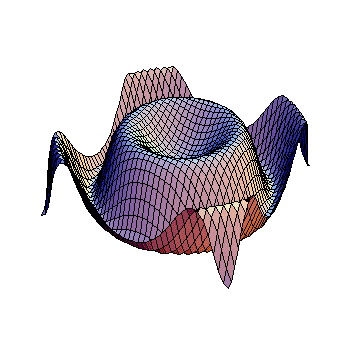Assuming the equation was meant to be read as
#y = arctan(sqrt(x^2-1)) + arc csc(x)#
We can say the derivative will be the sum of the two other derivatives
#u = arctan(sqrt(x^2-1))#
#v = arc csc(x)#
#v# will be easier to differentiate, know, knowing that
#csc(arc csc(x)) = x#
We differentiate both sides and use the chain rule, so
#1 = csc^'(arc csc(x))*arc csc^'(x)#
#1/csc^'(arc csc(x)) = arc csc^'(x)#
We know that the derivative of the cossecant is #-csc(x)cot(x)#, so, in other words
#1/(-csc(arc csc(x))cot(arc csc(x))) = arc csc^'(x)#
Since they're both rational functions we can bring them up to the numerator
#-tan(arc csc(x))/x = arc csc^'(x)#
Using the pythagorean identity #1 + cot^2(theta) = csc^2(theta)# we have
#1 + 1/(tan^2(arc csc(x))) = x^2#
#1/(tan^2(arc csc(x))) = x^2 - 1#
#tan(arc csc(x)) = 1/sqrt(x^2 - 1)# so
#arc csc^'(x) = -1/(xsqrt(x^2-1)) #
(There are authors that say it like this, there are people that have that leading x as #|x|#, considering we're working with #x > 1#, the absolute value bars aren't needed regardless of your philosophy if they should be there or not).
Now, we do #u = arctan(sqrt(x^2-1))#, for the sake of brevity, I'll skip the proof of the arctan's derivative, as the process is much like the one used for the arccsc, except it'd involve the #tan^2(theta) + 1 = sec^2(theta)# identity.
So we have
#u = arctan(sqrt(x^2-1))#
#u^' = arctan^'(sqrt(x^2-1))*sqrt((x^2-1))^'*2x#
It's important to remember we need to apply the chain rule twice here.
#u^' = 1/(1+(sqrt(x^2-1))^2)*1/(2sqrt(x^2-1))*2x#
#u^' = 1/(1+x^2-1)*1/(2sqrt(x^2-1))*2x#
#u^' = 1/x^2*1/(2sqrt(x^2-1))*2x#
#u^' = 1/(xsqrt(x^2-1))#
Summing them up we have
#y^' = 1/(xsqrt(x^2-1)) - 1/(xsqrt(x^2-1)) = 0#
Which makes sense if you look at the graph for #x > 0#. For smaller values the absolute value probably would have mattered and would have made the derivative non-zero.

